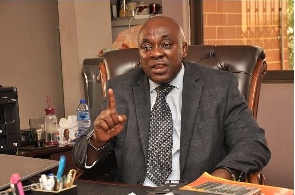 Ghana ought to be very careful in how it treats the Sankofa/Afina issue
Ghana ought to be very careful in how it treats the Sankofa/Afina issue
Ghana has been one of the bright stars of the oil and gas market in the 2010s, ramping up its crude production from virtually zero to some 215kbpd by the end of the decade.
The startup of the Jubilee field in 2010, merely 3 years after its discovery, was Ghana’s first genuine claim for a place under the sun. Then came the first offshore non-associated output from Sankofa that has largely helped the domestic industries to ease their dependence on external imports and reasons for further optimism.
A string of new events, however, poses a heretofore unsettled question to all those interested in Ghana’s offshore. As is often the case with projects that exceed general expectations, the Ghanaian government might be overexerting itself in making the nascent oil industry serve its interests.
For quite some time the general political narrative cut through the West African market somewhat noiselessly. In early May 2020 Ghana’s Energy and Petroleum Minister John Peter Amewu suggested that the Sankofa oil field (operated by the Italian ENI) and the Afina oil discovery (operated by the Ghanaian Springfield) should be unified into one joint project.
According to media reports, the Oil Minister sent a letter to the operator of the former’s operator company, calling for a timely settlement of the issue within 120 days. The suggested time interval has long run out, but Ghana’s aspiration has seemingly only fortified, coming back at the end of the year with even greater vehemence.
For many industry observers, it would seem absurd that the Energy Minister has the competence to decide which fields should be unified. This, however, is completely legal in Ghana following several recent regulatory changes – in 2016 the Ghanaian government has introduced this clause so as to streamline new projects.
Technically, Ghana’s Energy Minister can also force reticent sides to acquiesce to its intent with the proviso that the top-down decision can only be done if both plays are appropriately appraised.
And it is here that the story gets a unique African flavor as it seems that authorities in Accra are considering the fields to be one, despite all of Sankofa’s shareholders protesting this view. Perhaps even more importantly, in an ideal world the Afina discovery should be officially confirmed as a commercial one, a step that was still not taken by its operator.
The Afina-1 discovery well was spudded in September-October 2019 to a total depth of 4085 meters and wielded a light oil play with a gross thickness of 65 meters.
Afina was the first-ever well drilled by Springfield Exploration and Production, a Ghanaian company that took a 80% operatorship role in the West Cape Three Points Block 2, with the remaining stake going to Ghana’s national oil company GNPC.
Upon the discovery, Springfield stated that Afina’s oil-in-place reserves are assumed at around 1.5 BBbls, with a further 3 BBbls of undiscovered potential, making it a superb start to the company’s drilling history (provided the discovery is commercial though).
In contrast to Afina, the 0.5 BBbls Sankofa has already been producing since 2017, eight years after its initial discovery by Vitol’s Ghanaian upstream branch.
Peculiar as the above might seem, Accra’s assertive view of how it would prefer its offshore crude production to develop has another deficiency.
The Energy Ministry wants ENI to operate the prospective Sankofa-Afina field, however, it should be Springfield that gets the largest stake as Afina’s nominal reserves are higher, despite its commercial nature remaining questionable.
Mirroring a 54.5-45.5% split between Afina and Sankofa, ENI would receive only 20.2% of the future joint project, Vitol would be left with 16.2% whilst Springfield would get 44.7%.
Interestingly, the Ghanaian authorities have set up a May 2022 deadline to finalize the unitization deal so despite the indisposition of ENI and Vitol the outcome is already foreordained for them.
Ghana ought to be very careful in how it treats the Sankofa/Afina issue because it carries enormous reputational risks for future offshore projects. Throughout 2020 there was no exploration activity in Ghana’s offshore and the restoration of drilling is dependent on the operator of Sankofa, ENI, going forward with its plans in the Tano Basin.
Moreover, Sankofa might be perceived as a pioneering project, being the first non-associated gas field in Ghana’s offshore and has been playing an instrumental role in the African nation’s shedding some of its unnecessary hydrocarbon imports.
Using its gas production for electricity generation at an assumed cost of $6.6/mmBtu (with the involvement of the World Bank), Sankofa has doubly benefited Ghana by saving its currency reserves and by supplanting polluting oil products as sources of energy.
Coming back to Ghana’s oil ascent, the swift increases of 2017-2018 gave way to stagnation that was rendered even more apparent by the consequences of COVID-19.
Currently Ghana has two oil producers – Tullow with its Jubilee and TEN fields, and ENI with Sankofa – totaling around 190-200kbpd recently. The output volumes are unlikely to increase significantly as there seems to be no other project coming up in the pipeline.
The Pecan field, operated by Aker Energy, might have been the one to supplement the Ghana’s production portfolio, however overall delays in its development will postpone its commissioning, all the more so as Aker now wants to split it in two separate phases for the field’s northern and southern part.
Should there be any output additions over the course of 2021-2025, they would come from Tullow’s Greater Jubilee production ramp-up and not new projects.
- West Africa-focused gold miner Asante Gold to bid for Newmont's Akyem mine
- 'We have not entered into any unapproved mergers or acquisitions' - TOR denies sale claims
- New GNPC CEO takes office in May
- Crude oil prices rises 13% in three months
- Dangote to start gasoline deliveries in Nigeria next month
- Read all related articles












